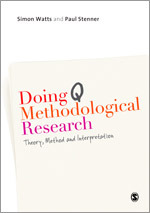Doing Q Methodological Research
Theory, Method & Interpretation
- Simon Watts - University of East Anglia, UK
- Paul Stenner - Open Univeristy, UK, The Open University, UK
Using worked examples throughout, the reader is guided through:
• important design issues
• the conduct of fieldwork
• all the analytic processes of Q methodology, including factor extraction, factor rotation and factor interpretation.
Drawing on helpful conceptual introductions to potentially difficult statistical concepts and a step-by-step guide to running Q methodological analyses using dedicated software, this book enables interested readers to design, manage, analyse, interpret and publish their own Q methodological research.
This is the book the Q community has been waiting for! Aspirational Q researchers will find it a comprehensive, balanced and thorough guide, taking them systematically from refining their research question(s) to publishing their first Q methodological study
Wendy Stainton Rogers
Professor Emerita, The Open University
Watts and Stenner's fresh, comprehensive introduction to Q methodology factor analysis and interpretation is consistently sensitive to the less-experienced researcher's need for clear explanations and extensive supporting details. All Q researchers will value its range of practical tips and elaboration of important concepts
Amanda Wolf, Editor, Operant Subjectivity: The International Journal of Q Methodology
According to the Q community this is' the book which they have been waiting for. To date, there lacked a book in which the simple and robust method is introduced. As a teacher and researcher, I am glad Watts and Stenner fill this gap with their book.[...]The content of Doing Q methodological research is divided into three parts, respectively into theory, method and interpretation. The book is peppered with examples and case studies and the authors give advice on very practical matters, such as conducting fieldwork, working with the participants and conducting good data management.
This is a comprehensive, clear, ‘one-stop start’ to the method with some very useful chapter summaries and appendices. [...]Together with the all-important recommended free software package for the data analysis if you were thinking of taking this approach this would be a good place to begin.
A lovely introduction to Q methodology which is not commonly taught across UG programmes of study. Is helpfully illustrated with examples and case studies.
The book is very clear and concise, plus it is fun to read. It is written in a way which provides the theoretical background first and then builds on the practical guidance.
A comprehensive book detailing the essentials of Q methodology for novice researchers in the field and also for those with more advanced qualitative researching skills wanting to update their knowledge and skill set in Q methodology. An easy to follow read for undergraduates students.
Q methodology won't necessarily be employed by many people in their early research efforts, but for those adventurous enough to give it a try, this book is invaluable. It's very readable, clear and comprehensive. I don't know of any other book on the topic that falls into this same "one stop reading" category.
This is an excellent book that is much needed with regards to this particular methodology. I teach Q methodology here at the University of Worcester and this book will now be our core text.
THis is a fantastic book, absolutely essential to anyone considering doing Q methods based research. there are almost no training courses available in this method, but with this book I felt confidant in undertaking research in this adn will use it as a tool for training my students
This is the best text I have read on the subject of Q methodology, both at an introductory level and for researchers wanting to shape their craft.







